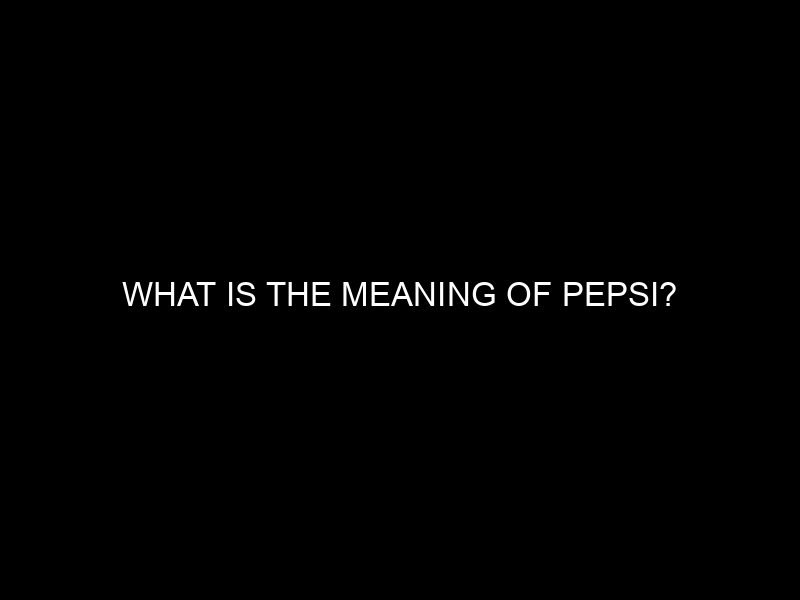In the realm of carbonated soft drinks, Pepsi stands as a towering icon, known universally for its distinctive taste and rich history. As a professional with an extensive background in Nigeria’s business sector and a deep understanding of the beverage industry, particularly with 7 Up, I offer a unique perspective on Pepsi’s significance. This article aims to unravel the layers of meaning behind Pepsi, delving beyond its status as a mere soft drink to explore its cultural, historical, and economic impacts.
The Deep-Rooted History and Evolution of Pepsi
Pepsi, initially introduced as “Brad’s Drink” in 1893 by Caleb Bradham, underwent a rebranding in 1898, adopting the name Pepsi-Cola. This change marked the beginning of its journey to becoming a globally recognized brand. The name “Pepsi” was derived from the word dyspepsia, meaning indigestion, which Bradham claimed the drink could alleviate, thus reflecting its early medicinal marketing.
The Cultural and Symbolic Significance of Pepsi
Throughout its history, Pepsi has transcended the boundaries of being a mere beverage. It has become a cultural symbol, reflecting the changing tides in society. In the 1960s, Pepsi’s “Pepsi Generation” campaign captured the essence of youth and freedom, resonating with the era’s spirit. This campaign was not just about selling a drink but about selling an ideal, a lifestyle that appealed to the younger generation.
Pepsi in Global Markets: Adapting and Thriving
Pepsi’s global expansion, particularly in diverse markets like Nigeria, is a testament to its adaptability and marketing prowess. In Nigeria, Pepsi is not just a drink; it’s a part of the social fabric, often associated with celebrations and social gatherings. The brand’s ability to tailor its marketing and product offerings to different cultures and tastes worldwide demonstrates its deep understanding of diverse consumer bases.
Economic Impact and Market Dynamics
Pepsi’s role in the global economy is substantial. As a key player in the beverage industry, its strategies and performance significantly influence market dynamics. The competition between Pepsi and its arch-rival, Coca-Cola, often dubbed the “Cola Wars,” has driven innovation and marketing strategies that have shaped the beverage industry.
Pepsi’s Ingredients and Health Perspectives
A key aspect of understanding Pepsi involves examining its ingredients. The primary components include carbonated water, high fructose corn syrup, caramel color, caffeine, phosphoric acid, and natural flavors. The health implications of these ingredients, especially concerning sugar and caffeine content, have been the subject of much debate, reflecting changing health trends and consumer preferences.
Pepsi’s Response to Health Trends
In response to growing health consciousness, Pepsi has diversified its portfolio to include lower-calorie options and non-carbonated beverages. This shift indicates Pepsi’s adaptability and commitment to meeting evolving consumer needs.
Pepsi and Sustainability: Environmental Considerations
Sustainability is a critical aspect of modern businesses, and Pepsi is no exception. The company has undertaken various initiatives to reduce its environmental footprint, such as water conservation efforts, reducing plastic use, and promoting recycling. These efforts reflect a broader trend in the industry towards more sustainable business practices.
FAQs about Pepsi
Q: How has Pepsi’s formula changed over the years? A: While the basic ingredients of Pepsi have remained consistent, there have been variations, such as the introduction of Diet Pepsi and Pepsi Zero Sugar, to cater to diverse consumer preferences.
Q: What makes Pepsi different from other colas? A: Pepsi is known for its unique taste, slightly sweeter and more citrusy than its competitors. This distinct flavor profile has been a key factor in its global popularity.
Q: How does Pepsi contribute to local economies? A: Pepsi contributes to local economies through job creation, local sourcing of materials where possible, and community engagement activities.
Q: What are Pepsi’s sustainability goals? A: Pepsi aims to reduce its carbon footprint, conserve water, decrease plastic use, and support recycling initiatives as part of its sustainability goals.
Q: Can Pepsi be considered a healthy beverage? A: Like many carbonated drinks, Pepsi is high in sugar. Moderation is key, and consumers are encouraged to balance their intake with healthier choices.
In conclusion, Pepsi’s meaning extends far beyond its identity as a carbonated soft drink. It represents a blend of cultural significance, economic impact, and adaptability in an ever-changing global landscape. As we continue to witness the evolution of this iconic brand, it’s clear that Pepsi’s story is intertwined with broader narratives of societal changes, health trends, and environmental considerations.

Leave a Reply